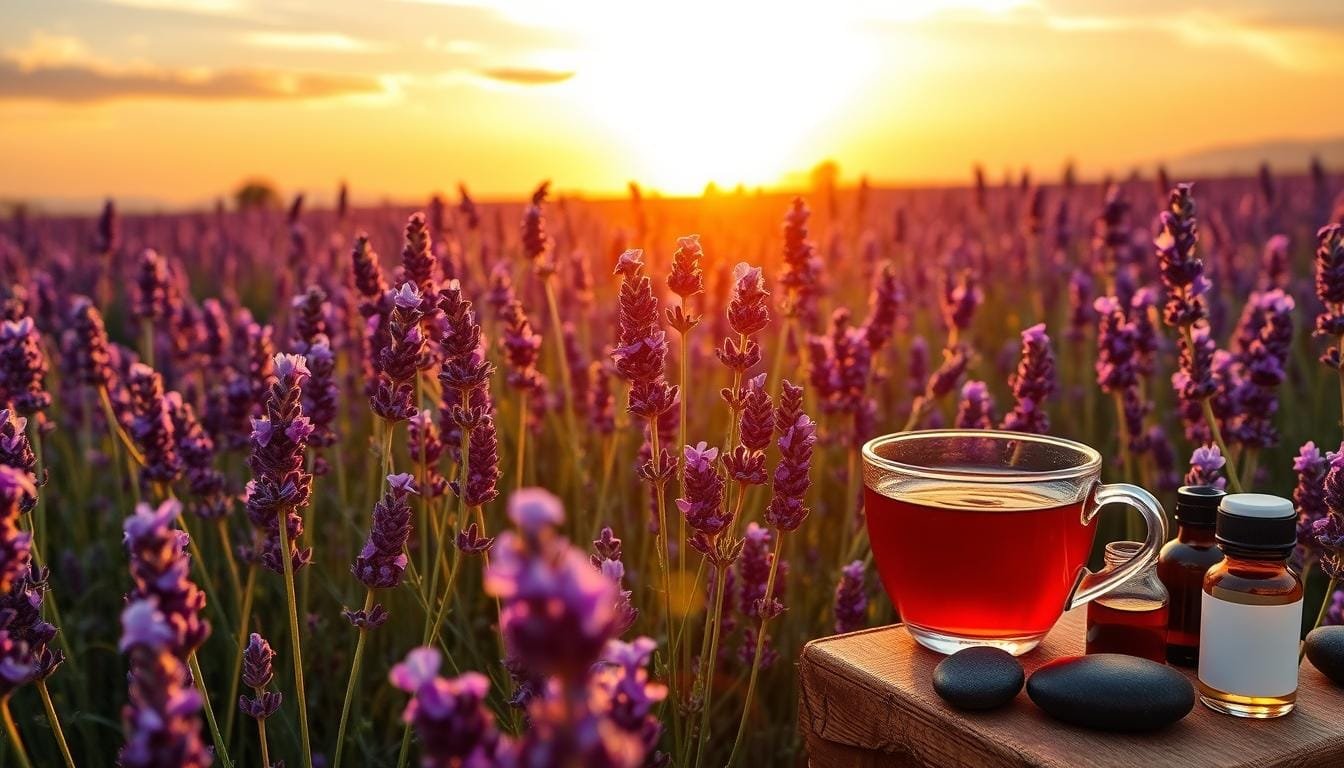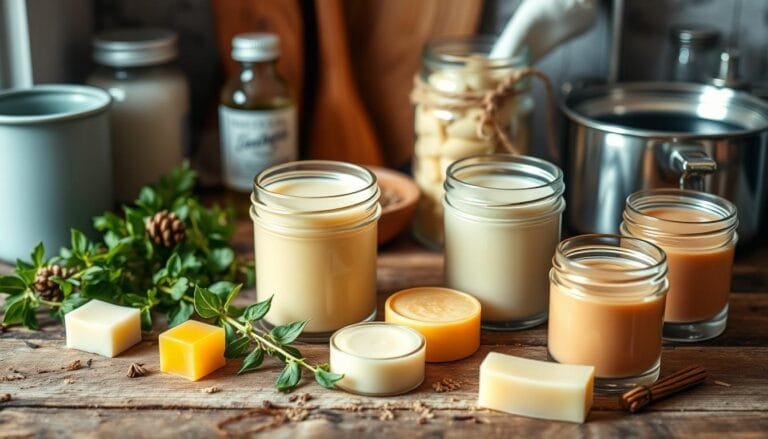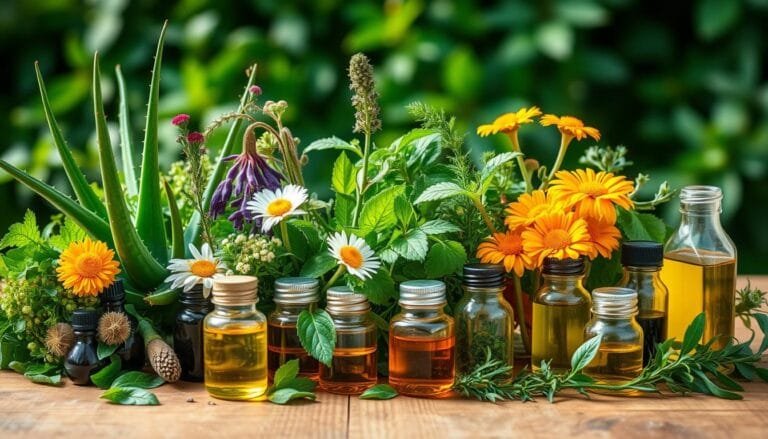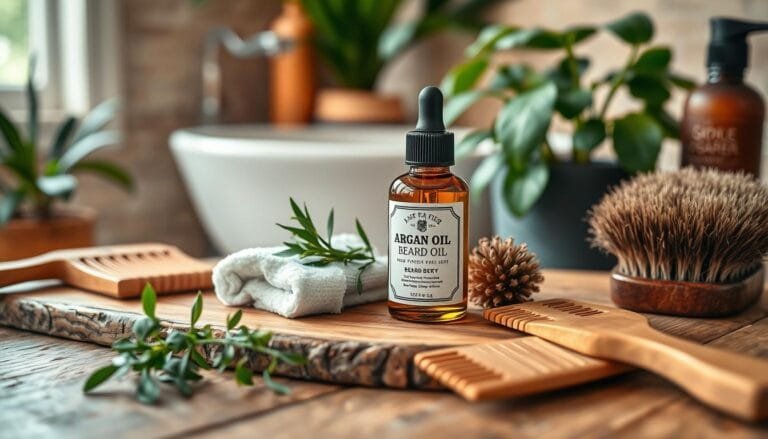I’ve always been drawn to natural remedies, and lavender is one that fascinates me. This fragrant flower comes from northern Africa and the Mediterranean. It’s been used for medicine for thousands of years.
The name “lavender” comes from the Latin “lavare,” which means “to wash.” This shows its long history in cosmetics and hygiene. But lavender does more than just smell good. Studies show it can help with sleep, mental health, and even healing wounds.
Exploring lavender’s healing effects is truly amazing. It has a big impact on our health and wellness. From ancient times to today, lavender is a natural gift for many health issues.
Understanding Lavender: From Ancient Times to Modern Medicine
Lavender has a long history, used by ancient civilizations for its healing powers. The purple plant, known as Lavandula angustifolia, is loved for its calming effects. It has many uses in traditional medicine.
Historical Uses Across Civilizations
In ancient Egypt, lavender was used in mummification. The Greeks, Romans, and Persians used it in baths for its cleansing and soothing effects. During the Middle Ages, herbalists and healers used lavender to treat many ailments.
Scientific Classification and Plant Properties
Lavender is part of the mint family, Lamiaceae. It’s known for its purple flowers, tall stems, and narrow leaves. Its essential oil, made from the flower spikes, has anti-inflammatory and calming compounds.
Recent studies have explored lavender’s uses in modern medicine. Lavender has over 30 species, dozens of subspecies, and hundreds of hybrids. Each has unique properties and uses.
“Lavender has been extensively studied for its various medicinal properties, including its calming effects, sleep-inducing capabilities, mood enhancement, pain relief, skin healing properties, and protective qualities.”
The Healing Power of Lavender: Scientific Evidence and Benefits
Lavender is more than just a pretty sight and a lovely scent. Recent studies have backed up its traditional uses, showing it has real healing powers.
Studies have shown lavender can help people sleep better. In one study, 60 ICU patients slept better with lavender essential oil. A 2022 review in Nursing in Critical Care looked at 20 trials on lavender for insomnia. It found 14 of them showed positive results.
Lavender also helps with mental health. It can lower anxiety and depression, sometimes as well as some medicines. A 2009 study found anxiety levels dropped by 14% with lavender aromatherapy.
Lavender has anti-inflammatory and pain-relieving effects too. A 2021 study found it could reduce pain after knee surgery. Another study in 2017 showed it helped lower blood pressure and heart rate after heart surgery.
Lavender is also good against germs and fungi. It can stop Candida albicans and fight off Staphylococcus aureus and Escherichia coli. This makes it a great natural option for many uses.
The science on lavender’s benefits is impressive. It helps with sleep, anxiety, pain, and fights germs. As more research comes out, lavender’s amazing abilities keep surprising us.
| Study | Findings |
|---|---|
| 2022 systematic review in Nursing in Critical Care | Analyzed 20 randomized controlled trials using lavender essential oil for insomnia, with 14 trials showing positive effects. |
| 2021 research | Suggested that inhaling lavender essential oil post-arthroscopic knee surgery may help reduce pain. |
| 2017 study | Found that inhaling diluted lavender essential oil after open-heart surgery led to reduced blood pressure and heart rate. |
| 2009 study | Reported a 14% decrease in anxiety levels after exposure to lavender aromatherapy. |
The research on lavender’s healing powers is amazing. It shows how versatile and beneficial this plant is. As we learn more, we see just how special lavender really is.
Lavender Essential Oil: Extraction and Potency
Lavender essential oil is made through a careful process. It usually involves steam distilling the plant’s flower spikes. The quality and benefits of lavender oil can change based on the lavender type used. Knowing the different lavender oils and their quality is key when picking the right one for you.
Different Types of Lavender Oils
The most common types of lavender oils include:
- English Lavender (Lavandula angustifolia) – Known for its superior medicinal properties and characteristic floral aroma.
- Lavandin (Lavandula × intermedia) – A hybrid variety often used in essential oil production due to its higher yield.
- Spanish/French Lavender (Lavandula stoechas) – Not recommended for homemade oil due to its inferior medicinal qualities.
Quality Indicators and Selection Guide
When choosing high-quality lavender essential oil, look for these signs:
- A strong, pure scent without synthetic additives.
- Storage in dark glass bottles to keep the oil’s strength.
- Dilution with a carrier oil, like olive or jojoba, at 0.5-2% for skin use.
Lavender’s strength makes it effective in small amounts for both aromatherapy and skin use. Its wide range of health benefits makes it a great addition to your natural health routine.
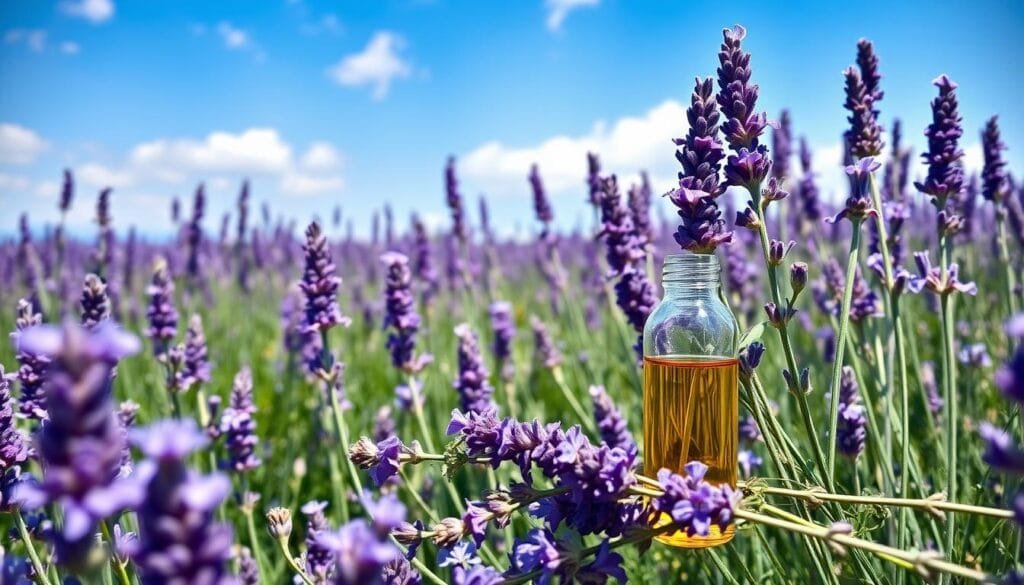
“It takes over 65,000 pounds of lavender flowers to produce just one pound of lavender oil, highlighting its potency.”
Sleep Enhancement and Insomnia Relief
If you’re having trouble sleeping or just want a better night’s rest, lavender might be what you need. Research shows that lavender’s scent can help you fall asleep quicker and feel more awake in the morning.
A 2020 study found that lavender oil made sleep better for patients in palliative care. This shows how lavender can help with sleep. It does this by boosting melatonin and calming the nervous system.
Using a few drops of high-quality lavender essential oil before bed could change your sleep. You can diffuse it, apply it to your skin, or drink lavender tea. This natural aid can help you sleep peacefully.
| Lavender Oil Component | Concentration Range |
|---|---|
| Linalool | 26.73% to 57.48% |
| Linalyl Acetate | 4.01% to 35.39% |
Linalool and linalyl acetate in lavender oil calm and help with sleep. They work by affecting calcium channels in the body.
“Studies supporting lavender oil as a sleeping aid are solid, though few,” says Dr. Charlene Gamaldo, a sleep expert.
Even though more research is needed, lavender’s long history and current studies suggest it’s good for sleep. Always use essential oils safely and talk to a doctor, if you have health issues.
Mental Health Benefits: Anxiety and Depression Support
Lavender, a fragrant purple flower, is known for its calming effects. New studies show it can help with anxiety and improve mood. This plant has been found to have a positive impact on mental health.
Clinical Studies on Anxiety Management
A big study found that lavender oil capsules reduced anxiety in people with anxiety disorders. The scent of lavender also helped lower anxiety in ICU patients and improved mood in cancer patients. These results show lavender’s value as a natural antidepressant and stress reliever.
Depression and Mood Enhancement Properties
Lavender aromatherapy has shown great promise for those with depression. It helped postpartum women and patients with kidney disease feel better. Lavender’s calming and mood-enhancing properties make it a natural choice for mental health support.

“Lavender’s ability to alleviate anxiety and lift mood makes it a valuable tool in our natural arsenal for supporting mental health and well-being.”
Research keeps finding new benefits of lavender. It’s clear lavender is a natural antidepressant and a good solution for anxiety and stress relief. By using nature, we can support our mental health and find balance in life.
Skin Health and Natural Healing Properties
Lavender is a natural wonder for healthy, glowing skin. It fights off bacteria and reduces swelling. This makes it great for many skin problems.
Research shows lavender works well on acne, eczema, and psoriasis. It has special oils that calm inflammation and make skin look smoother. These oils also help keep pores clean.
Lavender is also good for healing wounds. It helps make collagen and fix damaged tissue. It’s safe for sensitive skin when used right, helping with burns and minor irritations.
Looking to improve your skincare routine? Lavender is a great choice. It’s gentle and effective. Learn more about lavender for skin, natural skincare, wound healing, and acne treatment to see how it can change your skin.
“Lavender is a true skin-saver, helping with inflammation and making skin look healthy and bright.”
| Skin Condition | Lavender Benefits |
|---|---|
| Acne | Lavender’s antibacterial and anti-inflammatory properties help reduce breakouts and promote clearer skin. |
| Eczema | The calming and moisturizing effects of lavender can alleviate eczema symptoms and provide relief. |
| Psoriasis | Lavender’s ability to reduce inflammation and promote skin cell regeneration can help manage psoriasis flare-ups. |
| Wound Healing | Lavender oil has been shown to accelerate the wound-healing process, making it a valuable natural remedy. |
| Skin Irritation | Lavender’s soothing properties can provide relief for minor skin irritations, burns, and sunburns. |
Pain Management and Anti-inflammatory Effects
Lavender is a powerful herb with many uses. It can help manage different types of pain. Just smelling lavender essential oil can lessen migraine severity and frequency.
Its natural anti-inflammatory properties also help with muscle pain. Using lavender-infused massage oils can ease sore muscles.
Lavender works by changing how pain receptors work and reducing inflammation. It’s a natural way to ease headaches and muscle soreness.
Headache and Migraine Relief
Lavender’s scent can help with headaches and migraines. A 2012 study showed that inhaling lavender scent can lessen migraine symptoms. It’s a safe and easy way to find relief.
Muscular Pain Applications
Lavender is great for muscle pain because of its anti-inflammatory properties. When used as a massage oil, it can relax sore muscles. Research in 2015 found that lavender essential oil is a good pain reliever and anti-inflammatory.
| Essential Oil | Pain Management Benefits |
|---|---|
| Lavender | Reduces migraine severity, soothes muscle pain |
| Rose | Relieves menstrual cramps |
| Bergamot | Effective for neuropathic pain |
| Wintergreen and Peppermint | Provide cooling sensation and pain relief |
| Rosemary | Therapeutic for pain management |
| Eucalyptus | Good pain reliever and anti-inflammatory |
| Chamomile | Helps reduce pain medication need in osteoarthritis |
| Clary Sage | Reduces menstrual cramps |
| Ginger | Pain relief, anti-inflammatory, cough relief |
| Clove | Good for toothaches and general pain |
| Lemongrass | Decreases arthritis pain |
| Frankincense | Historical use for inflammation and pain relief |
Lavender is a natural and effective way to manage pain and inflammation. It’s great for headaches, muscle soreness, and more. This plant offers a gentle and holistic solution for pain relief.
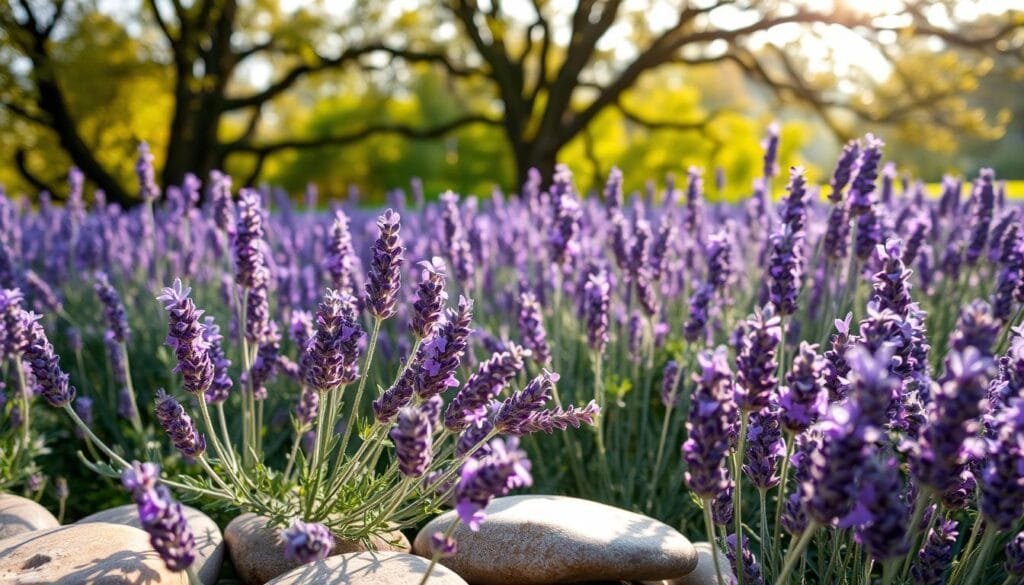
Aromatherapy Applications and Methods
Lavender aromatherapy is a natural way to use the plant’s soothing properties. One common method is using an essential oil diffuser to spread the lavender scent in a room. This lets you enjoy the calming aroma and its benefits for your mind and body.
Another favorite is making lavender-infused pillow sprays. Mix a few drops of lavender essential oil with water in a spray bottle. Then, mist your pillows and bedding for a good night’s sleep. Direct inhalation of the essential oil can also quickly bring relaxation and relief.
Using aromatherapy with touch, lavender-infused massage oils can make the experience even better. The essential oil mixes with a carrier oil, like jojoba or coconut, to moisturize the skin. At the same time, you get to enjoy the calming scent and massage benefits.
For a gentle, lasting scent, try lavender sachets in drawers, closets, or under your pillow. These small fabric pouches filled with dried lavender flowers or buds will softly perfume the air around you.
It’s important to use high-quality, pure lavender essential oil and follow proper dilution guidelines. This ensures safe and effective aromatherapy experiences.
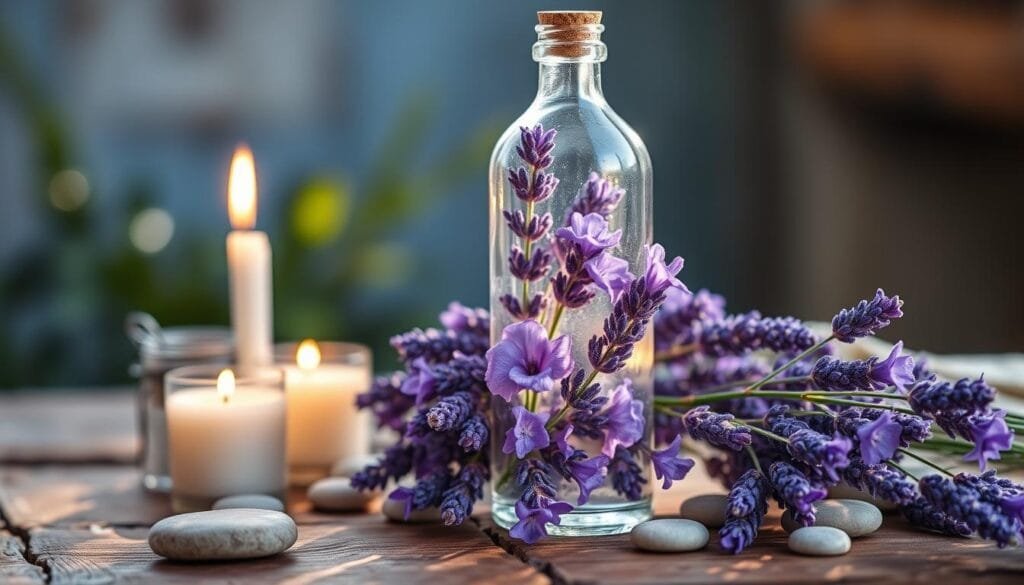
“Lavender’s pleasant floral scent has a profound effect on the mind and body, promoting relaxation and well-being.”
Safe Usage Guidelines and Possible Side Effects
Lavender is often seen as a safe natural remedy. But, it’s key to be careful when adding it to your routine. Essential oils should never be swallowed without a doctor’s advice, as they can be harmful if eaten.
When applying lavender oil to your skin, make sure to mix it well. This helps avoid any irritation or allergic reactions.
Research has hinted at a possible link between lavender oil and early breast growth in kids. More studies are needed to confirm this. Lavender might also affect certain medicines, like sedatives. So, always talk to a doctor before using it, if you’re on any meds or are expecting.
Lavender supplements can sometimes cause nausea, diarrhea, headaches, or skin rashes. But, products like Silexan are usually safe, even in big doses. By sticking to the right amounts and advice, you can enjoy lavender’s benefits safely.
